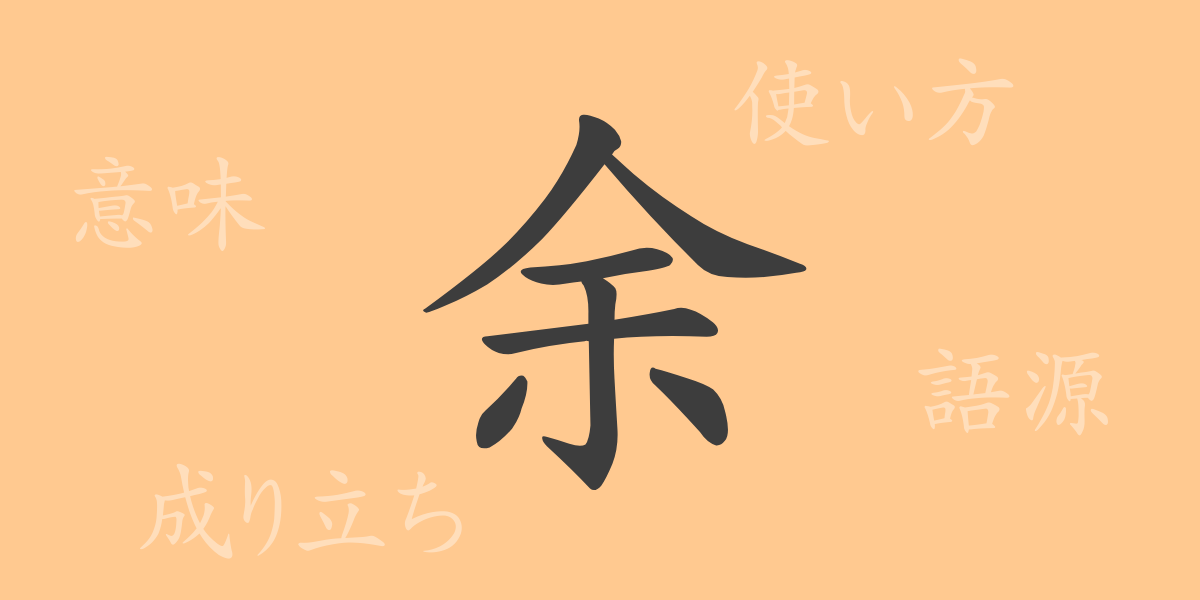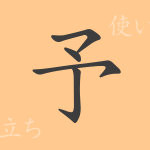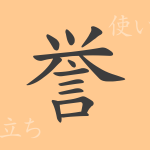The meaning embedded in a single kanji character is deeply conveyed through its form and history. The commonly used Japanese kanji “余” (yo) frequently appears in our daily lives, but what kind of story lies behind it? In this article, we will delve into the origins, meanings, usage, readings, stroke count, radicals, and even idioms and proverbs associated with “余” (yo). Let’s rediscover the depth of the Japanese language while glimpsing a part of the culture and history that resides in each kanji character.
The Origins (Etymology) of 余 (yo)
The journey to explore the origins of the kanji “余” (yo) takes us back to ancient China. “余” (yo) originally developed from a pictogram symbolizing overflowing water. It is said that ancient people illustrated the overflowing water to represent its flow. Over time, this kanji evolved to mean “something extra” and later came to be used to refer to oneself as “I” (yo).
The Meanings and Usage of 余 (yo)
The kanji “余” (yo) primarily has two meanings. The first meaning is “something extra” or “to be in excess,” indicating a state where something exists beyond what is necessary. The second meaning is a humble way to refer to oneself as “I” (yo) or “watakushi” (私). This usage is particularly seen in literary works and formal contexts. The way “余” (yo) is used varies depending on the context, but both meanings add depth to Japanese expressions.
Readings, Stroke Count, and Radicals of 余 (yo)
The kanji “余” (yo) well represents the characteristics of the Japanese language in its readings and structure.
- Readings: The on’yomi (音読み) is “yo,” and the kun’yomi (訓読み) includes “amaru” (あまる) and “amasu” (あます).
- Stroke Count: “余” (yo) consists of 9 strokes in total.
- Radical: The radical of this kanji is “ihen” (いへん), which is represented by the left-side component “亠” (tō).
Idioms, Proverbs, and Phrases Using 余 (yo) and Their Meanings
Idioms, proverbs, and phrases that include “余” (yo) enrich the expressions in Japanese. Here are some examples:
- 余裕 (yoyū): Refers to having ample means, time, or strength to accomplish something.
- 余情 (yojō): The lingering feelings or emotions after an event has ended.
- 余命 (yomei): The remaining period of a person’s life until death.
- 余白 (yohaku): The intentionally left empty space around text or images.
- 余計 (yokei): Something that is more than necessary; also refers to unnecessary things.
These idioms and phrases are frequently used in daily conversation and written language, illustrating the broad meanings of “余” (yo).
Summary of 余 (yo)
The kanji “余” (yo), as its form suggests, means something overflowing or extra and is used in various ways in our lives. Additionally, its aspect as a humble term for oneself conveys the subtle nuances unique to the Japanese language. Understanding the meaning embedded in a single character like this is key to using words more richly. Through this exploration, we hope to appreciate the depth of the Japanese language and cherish the history and culture embedded in each kanji character.
“`

























